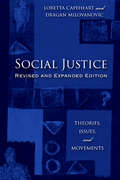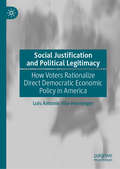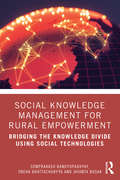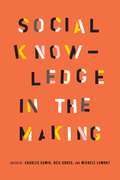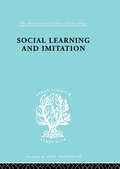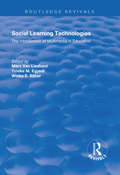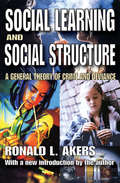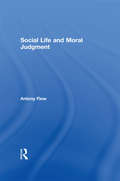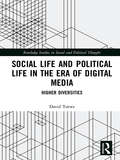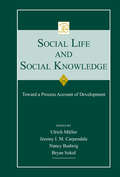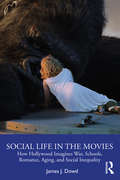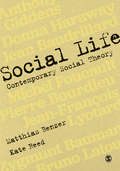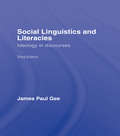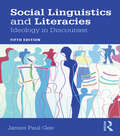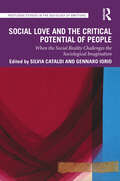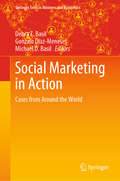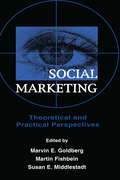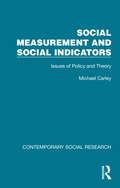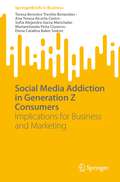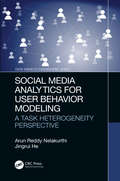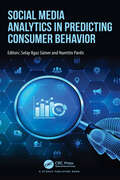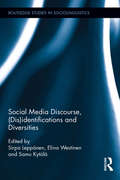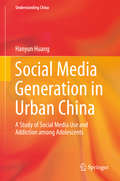- Table View
- List View
Social Justice: Theories, Issues, and Movements (Revised and Expanded Edition) (Critical Issues in Crime and Society)
by Dragan Milovanovic Loretta CapeheartAn eye for an eye, the balance of the scales – for centuries, these and other traditional concepts exemplified the public’s perception of justice. Today, popular culture, including television shows like Law and Order, informs the public’s vision. But do age-old symbols, portrayals in the media, and existing systems truly represent justice in all of its nuanced forms, or do we need to think beyond these notions? The second edition of Social Justice: Theories, Issues, and Movements responds to the need for a comprehensive introduction to these issues. Theories of social justice are presented in an accessible fashion to encourage engagement of students, activists, and scholars with these important lines of inquiry. Issues are analyzed utilizing various theories for furthering engagement in possibilities. Struggles for justice -- from legal cases to on the ground movements -- are presented for historical context and to inform the way forward.
Social Justification and Political Legitimacy: How Voters Rationalize Direct Democratic Economic Policy in America
by Luis Antonio Vila-HenningerThis volume explores voters’ political rationalizations. The author analyzes semi-structured interview data from 120 American voters collected from 2013-2015 about their positions on three economic referenda—or “direct democratic economic policies” (DDEPs) on the Arizona state ballot from 2008-2012. Building on the literature on voter reasoning and rationalization, the author firstly probes how the intersection of economic position and partisan affiliation shape partisan voters’ rationalizations of their DDEP positions. Secondly, he investigates the political and economic discourses that voters use to justify their DDEP positions. This book extends classic sociological theories of individual-level and collective legitimacy, along with contemporary theories of voter rationalization. The findings also help to build theories of American political ideology and values, neoliberalism, moral economy, and norms of self-interest.
Social Knowledge Management for Rural Empowerment: Bridging the Knowledge Divide Using Social Technologies
by Somprakash Bandyopadhyay Sneha Bhattacharyya Jayanta BasakThis book develops and examines the concepts and strategies for rural empowerment through the formation of a community-driven social knowledge management (SKM) framework aided by social technology. The framework is aimed at mobilizing knowledge resources to bridge the rural–urban knowledge divide while securing rural empowerment using digital connections and social collaborations built on strategies of self-sustenance and self-development. With key empirical findings supplemented by relevant theoretical structures, case studies, illustrative figures and a lucid style, the book combines social technologies and social development to derive a social knowledge management platform. It shows how the proposed SKM framework can enhance knowledge capabilities of rural actors by facilitating connection among rural–urban entities through formation of purposive virtual communities, which allow social agents to create, modify and share content collaboratively. The volume brings forward diverse issues such as conceptual foundations; bridging the rural–urban knowledge and information divide; issues of information and knowledge asymmetry; a knowledge-theoretic perspective of rural empowerment; knowledge capability, freedom of choice and wellbeing, to provide a comprehensive outlook on building a knowledge society through digital empowerment. This book will be useful to scholars and researchers of development studies, rural sociology, management studies, IT/IS, knowledge management and ICT for development, public policy, sociology, political economy and development economics. It will benefit professionals and policymakers, government and nongovernment bodies and international agencies involved with policy decisions related to application of technologies for rural development, social workers and those in the development sector.
Social Knowledge in the Making
by Michèle Lamont Neil Gross Charles CamicOver the past quarter century, researchers have successfully explored the inner workings of the physical and biological sciences using a variety of social and historical lenses. Inspired by these advances, the contributors to Social Knowledge in the Making turn their attention to the social sciences, broadly construed. The result is the first comprehensive effort to study and understand the day-to-day activities involved in the creation of social-scientific and related forms of knowledge about the social world. The essays collected here tackle a range of previously unexplored questions about the practices involved in the production, assessment, and use of diverse forms of social knowledge. A stellar cast of multidisciplinary scholars addresses topics such as the changing practices of historical research, anthropological data collection, library usage, peer review, and institutional review boards. Turning to the world beyond the academy, other essays focus on global banks, survey research organizations, and national security and economic policy makers. Social Knowledge in the Making is a landmark volume for a new field of inquiry, and the bold new research agenda it proposes will be welcomed in the social science, the humanities, and a broad range of nonacademic settings.
Social Learn&Imitation Ils 254 (International Library of Sociology)
by John Dollard Neal E. MillerFirst Published in 1998. Routledge is an imprint of Taylor & Francis, an informa company.
Social Learning Technologies: The Introduction of Multimedia in Education (Routledge Revivals)
by Wiebe E. Bijker Marc Van Lieshout Tineke M. EgyediThis title was first published in 2001. Offering a fascinating new perspective on the processes of technical and social change, this book complements contemporary innovation studies by adopting an integrative perspective on social learning as characterized by the introduction of educational multimedia. The contributors provide insights into policy making in the fields of education and multimedia, educational practices related to the use of multimedia and wider processes of technical change. Accessible in style, the book will appeal to researchers and policy makers alike and will be of particular relevance to those interested in education, media, science and technology.
Social Learning and Social Structure: A General Theory of Crime and Deviance
by Ronald AkersThe social learning theory of crime integrates Edwin H. Sutherland's diff erential association theory with behavioral learning theory. It is a widely accepted and applied approaches to criminal and deviant behavior. However, it is also widely misinterpreted, misstated, and misapplied.This is the fi rst single volume, in-depth, authoritative discussion of the background, concepts, development, modifications, and empirical tests of social learning theory. Akers begins with a personal account of Sutherland's involvement in criminology and the origins of his infl uential perspective. He then traces the intellectual history of Sutherland's theory as well as social learning theory, providing a comprehensive explanation of how each theory approaches illegal behavior. Akers reviews research on various correlates and predictors of crime and delinquency that may be used as operational measures of differential association, reinforcement, and other social learning concepts.Akers proposes a new, integrated theory of social learning and social structure that links group diff erences in crime to individual conduct. He concludes with a cogent discussion of the implications of social learning theory for criminology and public policy. Now available in paperback, with a new introduction by the author, this volume will be invaluable to professionals and for use in courses in criminology and deviance.
Social Life and Moral Judgment
by Antony Flew"In Social Life and Moral Judgment, author and philosopher Antony Flew examines the social problems induced by the mature welfare state. Welfare states make ever-increasing financial demands on their citizenry, yet the evidence clearly supports that such demands are not sustainable. In this superlative collection of thematic essays, Flew investigates and explains why this is so, and calls for a return to individual responsibility.The first essay establishes the philosophical basis for his argument. ""Is Human Sociobiology Possible?"" answers its titular question in the negative, asserting that we are all members of a peculiar type of creature that can, and therefore must, be responsible for whatever choices between various courses of action or inaction that are open to us as individuals. In other essays, Flew shows how state welfare systems inevitably corrupt and demoralize their citizens by encouraging ever-more people to apply for welfare entitlements and reducing the incentives to avoid or escape the conditions warranting those entitlements. He investigates the origins of this new kind of welfare entitlement, and shows how very different what politicians and public sector employees produce is from what these people claim to be producing.Flew shows that the drive for ""social"" justice appears to require that the justly acquired income and wealth of all citizens should be progressively taxed away or supplemented by the state so that the eventual result is more, though never perfect, equality. This objective, he asserts, must be radically distinguished from old-fashioned, without prefix or suffix, justice. It was this type of justice Adam Smith referred to when he famously said that it is a virtue ""of which the observance is not left to the freedom of our wills"" but ""which may be extorted by force."" Flew question the aims of those who would discredit wealth creators and wealth-creating investment, showing that these are the same people who prom"
Social Life and Political Life in the Era of Digital Media: Higher Diversities (Routledge Studies in Social and Political Thought)
by David ToewsDigital technology has vastly broadened and complexified social life, levelling opportunities for communication and producing a new awareness of the importance of diversity of social relations, as well as of life on the planet. This book explores the ways in which social media, by encouraging human curiosity and sociability in relation to these developments, has highlighted for users their own nature as social beings who have discovered new ways to get along with each other, as well as new challenges. The complexity of networks on social media has created new kinds of conflicts, and new ways to mediate older kinds of conflicts, that have resulted in a demand for new forms of political participation, thus reinvigorating political activity, without extending the practice of ‘politics as usual’. However, with concerns for the planet in the back- ground, a tendency for elites and ordinary people alike to want to see a political solution to every problem in social life has become an unsustainable and troubling trend. This book argues that enthusiasms for social media can be tempered in a helpful manner through an engagement with studies of social media in relation to understandings of the history of modern social life provided by sources in classical and contemporary sociology and political theory. Social media makes possible new sociable opportunities and multiple publics, but at the same time represents important continuities with modern social life of earlier times, such as the respect in which it works to limit political action within the boundaries of a generalized public, thus constraining demagoguery and challenging the arrogance of elites who seek to impose certain forms of political life. Engaging with the work of Deleuze, Tarde, Simmel, Lazzarato, Latour, Harman, Heidegger, Arendt, Archer, Wellman, Bergson and others, Social Life and Political Life in the Era of Digital Media advances a new understanding of modernity offered by social media, re-establishing the autonomy of social life over and against political life and re-articulating the relationship between the social and political. As such, it will appeal to scholars of social and political theory and cultural and media studies.
Social Life and Social Knowledge: Toward a Process Account of Development (Jean Piaget Symposia Ser.)
by Ulrich Müller Jeremy I. M. Carpendale Nancy Budwig Bryan SokolIn this new volume, leading researchers provide state-of-the-art perspectives on how social interaction influences the development of knowledge. The book integrates approaches from a variety of disciplines including developmental psychology, psychopathology, philosophy, anthropology, sociology, evolutionary biology, and primatology. It reviews the
Social Life in the Movies: How Hollywood Imagines War, Schools, Romance, Aging, and Social Inequality
by James J. DowdThrough an analysis of hundreds of Hollywood movies, this book examines some of the most contentious social issues of our time, including racism, social inequality, sexism, and gerontophobia. With studies of some of the most enduring film genres in Hollywood’s history, including romantic films such as Casablanca, war movies from World War II through the Iraq and Afghanistan conflicts, alienation films, including Five Easy Pieces and Lost in Translation, the school movie, from Goodbye, Mr. Chips to other films set in academia, including Dead Poets Society and Dangerous Minds, the book outlines and demonstrates the sociological approach to viewing films and highlights the socially conservative nature of much Hollywood movie production, which draws on common stereotypes and reinforces dominant cultural values - but is also capable of challenging and serving to change them.
Social Life: Contemporary Social Theory
by Kate Reed Matthias BenzerIn Social Life, the authors highlight, explain, and scrutinize socio-theoretical analyses of contemporary social relations and conditions - put forward by eight modern social theorists - and analyse how these have informed sociological inquiries into people’s lives in today’s social world. The book discusses the works of the following social theorists: Anthony Giddens Pierre Bourdieu Bruno Latour Donna Haraway Zygmunt Bauman Jean-Francois Lyotard Michel Foucault Jean Baudrillard In each chapter, the authors identify the key components of each theorist’s conception of society and apply the theories outlined to specific, modern phenomena. This connection with modern-day phenomena allows for a critical interrogation of issues in contemporary society, including: Inequality and Capital, Power, Fear and Terrorism, Immune System Discourse, Suffering, and Climate Change. Essential reading for all sociology students studying social theory and the works of modern social theorists.
Social Life: Contemporary Social Theory
by Kate Reed Matthias BenzerIn Social Life, the authors highlight, explain, and scrutinize socio-theoretical analyses of contemporary social relations and conditions - put forward by eight modern social theorists - and analyse how these have informed sociological inquiries into people’s lives in today’s social world. The book discusses the works of the following social theorists: Anthony Giddens Pierre Bourdieu Bruno Latour Donna Haraway Zygmunt Bauman Jean-Francois Lyotard Michel Foucault Jean Baudrillard In each chapter, the authors identify the key components of each theorist’s conception of society and apply the theories outlined to specific, modern phenomena. This connection with modern-day phenomena allows for a critical interrogation of issues in contemporary society, including: Inequality and Capital, Power, Fear and Terrorism, Immune System Discourse, Suffering, and Climate Change. Essential reading for all sociology students studying social theory and the works of modern social theorists.
Social Linguistics and Literacies: Ideology in Discourses (Critical Perspectives On Literacy And Education Ser.)
by James GeeThis fully-updated new edition engages with topics such as orality and literacy, the history of literacy, the uses and abuses of literacy in that history, the analysis of language as cultural communication, and social theories of mind and meaning, among many other topics. It represents the most current statement of a widely discussed and used theory about how language functions in society, a theory initially developed in the first edition of the book, and developed in this new edition in tandem with analytic techniques for the study of language and literacy in context, with special reference to cross-cultural issues in communities and schools. Built around a large number of specific examples, this new edition reflects current debates across the world about education and educational reform, the nature of language and communication, and the role of sociocultural diversity in schools and society. One of the core goals of this book, from its first edition on, has been to develop a new and more widely applicable vision of applied linguistics. It will be of interest to researchers, lecturers and students in education, linguistics, or any field that deals with language, especially in social or cultural terms.
Social Linguistics and Literacies: Ideology in Discourses (Critical Perspectives On Literacy And Education Ser.)
by James GeeIn its first edition, Social Linguistics and Literacies was a major contribution to the emerging interdisciplinary field of sociocultural approaches to language and literacy, and was one of the founding texts of the 'New Literacy Studies'. This book serves as a classic introduction to the study of language, learning and literacy in their social, cultural and political contexts. It shows how contemporary sociocultural approaches to language and literacy emerged and: Engages with topics such as orality and literacy, the history of literacy, the nature of discourse analysis and social theories of mind and meaning Explores how language functions in a society Surveys the notion of 'discourse' with specific reference to cross-cultural issues in communities and schools. This fifth edition offers an overview of the sociocultural approaches to language and literacy that coalesced into the New Literacy Studies. It also introduces readers to a particular style of analyzing language-in-use-in-society and develops a distinctive specific perspective on language and literacy centered on the notion of "Discourses". It will be of interest to researchers, lecturers and students in education, linguistics, or any field that deals with language, especially in social or cultural terms.
Social Love and the Critical Potential of People: When the Social Reality Challenges the Sociological Imagination (Routledge Studies in the Sociology of Emotions)
by Silvia CataldiThis book unveils the concept of social love as a kind of ‘Karst River’ that flows through the history of sociology, reassessing it as a form criticism by people in everyday life. Adopting an interdisciplinary perspective, this book offers both theoretical and empirical reflections on social love. It shows that love is not only central to the human experience, but that it can also help to interpret and intervene in social problems such as climate change, poverty, xenophobia, and the (post-)COVID crisis, recognizing people as actors in social change. It explores the idea of love as a key element in the promotion of solidarity and recognition in today’s plural and unequal societies. Based on empirical research on social love conducted through both qualitative and quantitative methods, especially in Europe and Latin America, this book explores the social dimension of love. Providing overviews on key questions and studies on current issues, the book is essential reference and resource for researchers, students, social workers, and professionals in social sciences, social philosophy, anthropology, social psychology, sociology of emotions and postmodern literature.
Social Marketing in Action: Cases from Around the World (Springer Texts in Business and Economics)
by Debra Z. Basil Gonzalo Diaz-Meneses Michael D. BasilThis textbook provides students with real-world social marketing case studies from different countries and regions around the world, taking learners from classroom theory to practice. The primary objective is to clearly portray to students distinct, identifiable steps that are essential for successful social marketing campaigns. Core social marketing practices are applied to each case to help students master social marketing principles and apply them to their own real world social marketing activities in order to affect positive social change. This textbook first provides the tools necessary to understand the effective applica- tion of social marketing, and then offers 24 case studies exemplifying effective social marketing efforts from all around the world. Specifically, Part I clearly and concisely explains the principles of social marketing in five chapters: • Upstream vs. downstream social marketing, SWOT, competition • Fundamentals of social marketing, ethics • Formative and Evaluative Research • Theories applied in social marketing • A historical perspective on social marketing Part II features 24 social marketing case studies that demonstrate the application of social marketing principles. All 24 cases follow a consistent structure that includes: • Background • Positioning • SWOT • Research • Objectives • The 4 P’s • Target audience • Evaluation • Barriers and benefits • Discussion • Competition This format allows for students and professors to easily and effectively select individual cases and compare between cases. This textbook also allows instructors to encourage critical thinking by having students compare and contrast not only the cases themselves, but the applications used. In addition, teaching guides with answers to discussion questions, suggestions for activities inside and outside of the classroom and further readings are available to assist professors in teaching from this book.
Social Marketing: Theoretical and Practical Perspectives
by Martin Fishbein Marvin E. Goldberg Susan E. MiddlestadtSocial Marketing: marketing in the service of societal problems. Does this approach represent dangerous social engineering, or is it the best hope we have to treat what are often regarded as intransigent problems? For both academics and practitioners involved with social marketing, the domain remains in its infancy. Programs and approaches are being developed and implemented by practitioners; academics are defining "what it is," "where it comes from," and "where it is going." This book incorporates many of the presentations made at the "Role of Advertising in Social Marketing" Conference sponsored by the Society for Consumer Psychology. Professionals from academia, government, and non-government organizations address a highly diverse and interesting set of societal concerns ranging from organ donation to violence in sports, from efforts to promote safe sex and family planning to better understand cigarette smokers and their perceptions. Are marketing's "four Ps"--product, price, place, and promotion--enough to help solve these problems, or does social marketing at the end of the 1990s need to call on other Ps, such as political persuasion? This volume thoughtfully addresses theoretical and empirical issues challenging academics and practitioners alike to find out how to borrow the best of marketing for application in social marketing.
Social Measurement and Social Indicators: Issues of Policy and Theory (Contemporary Social Research)
by Michael CarleyFor the early pioneers of the social indicator movement, the possibilities of doing social good by developing the tools of social measurement seemed endless. However, in the early 1980s these high, and perhaps naïve, hopes remained unfulfilled, especially for the data needs of the policy-maker. If not pessimistic, administrators and public policy-makers were at least guarded about the usefulness of social indicators as an aid to increasingly complex decision-making.These difficulties reflected both policy-related and methodological issues. Originally published in 1981, Social Measurement and Social Indicators is not a ‘how-to’ guide on the construction of social indicators, but rather a critical and optimistic view of these central issues, as embodied in the literature and in practice at the time. Michael Carley contrasts some of the basic problems of social measurement with government’s needs for reliable information, organised by their policy usefulness and statistical sophistication.The book then discusses the critical relationship between social indicators and social theories and models, as well as the role of social information in the policy process. Later chapters look at the audience, the problems, and the prospects for national social reports; and explore in detail three different applications of social indicators to urban analysis. Throughout the book helpful examples are drawn from North American, UK and European experience.Social Measurement and Social Indicators is aimed at a cross-disciplinary audience in government and the universities. For students, it will serve as a compact introduction to the broad field of social indicators; for administrators, it explores philosophical and measurement problems and suggests criteria for interpretation; for researchers, it places social indicator efforts into a wider policy analysis perspective – with its inescapable political value judgemental, and bureaucratic aspects.
Social Media Addiction in Generation Z Consumers: Implications for Business and Marketing (SpringerBriefs in Business)
by Teresa Berenice Treviño Benavides Ana Teresa Alcorta Castro Sofia Alejandra Garza Marichalar Mariamiranda Peña Cisneros Elena Catalina Baker SuárezSocial media has become vital in Generation Z users' daily lives, as they are the most connected group through social media; however, studies have shown the negative side of using social media heavily, particularly loneliness. Furthermore, the COVID-19 pandemic has contributed to the significant growth of social media use with Generation Z users, which has shown to cause negative psychological effects. This book explores the behaviors of Generation Z consumers on various social media platforms (including interaction with brands as well as persons) and, using results from a Bergen Social Media Addiction Scale (BSMAS) analysis, explores the potential risks and causes of social media addiction in this generation. In particular, it offers an integrative model to help marketers understand social media addition and ways in which companies and associations can promote a more conscious use of social media by acknowledging that pathological use of social media has negative effects. This book is useful for students, researchers, scholars interested in empirical research on consumer social media use and addiction.
Social Media Analytics for User Behavior Modeling: A Task Heterogeneity Perspective (Data-Enabled Engineering)
by Arun Reddy Nelakurthi Jingrui HeWinner of the "Outstanding Academic Title" recognition by Choice for the 2020 OAT Awards. The Choice OAT Award represents the highest caliber of scholarly titles that have been reviewed by Choice and conveys the extraordinary recognition of the academic community. In recent years social media has gained significant popularity and has become an essential medium of communication. Such user-generated content provides an excellent scenario for applying the metaphor of mining any information. Transfer learning is a research problem in machine learning that focuses on leveraging the knowledge gained while solving one problem and applying it to a different, but related problem. Features: Offers novel frameworks to study user behavior and for addressing and explaining task heterogeneity Presents a detailed study of existing research Provides convergence and complexity analysis of the frameworks Includes algorithms to implement the proposed research work Covers extensive empirical analysis Social Media Analytics for User Behavior Modeling: A Task Heterogeneity Perspective is a guide to user behavior modeling in heterogeneous settings and is of great use to the machine learning community.
Social Media Analytics in Predicting Consumer Behavior
by Selay Ilgaz Sümer Nurettin ParıltıInformation is very important for businesses. Businesses that use information correctly are successful while those that don’t, decline. Social media is an important source of data. This data brings us to social media analytics. Surveys are no longer the only way to hear the voice of consumers. With the data obtained from social media platforms, businesses can devise marketing strategies. It provides a better understanding consumer behavior. As consumers are at the center of all business activities, it is unrealistic to succeed without understanding consumption patterns. Social media analytics is useful, especially for marketers. Marketers can evaluate the data to make strategic marketing plans. Social media analytics and consumer behavior are two important issues that need to be addressed together. The book differs in that it handles social media analytics from a different perspective. It is planned that social media analytics will be discussed in detail in terms of consumer behavior in the book. The book will be useful to the students, businesses, and marketers in many aspects.
Social Media Discourse, (Routledge Studies in Sociolinguistics)
by Sirpa Leppanen Elina Westinen Samu KytolaThis volume serves as an in-depth investigation of the diversity of means and practices that constitute (dis)identification and identity construction in social media. Given the increasing prevalence of social media in everyday life and the subsequent growing diversity in the types of participants and forms of participation, the book makes the case for a rigorous analysis of social media discourses and digital literacy practices to demonstrate the range of semiotic resources used in online communication that form the foundation of (dis)identification processes. Divided into two major sections, delineating between the (dis)identification of the self across various social categories and the (dis)identification of the self in relation to the "other", the book employs a discourse-ethnographic approach to highlight the value of this type of theoretical framework in providing nuanced descriptions of identity construction in social media and illuminating their larger, long-term societal and cultural implications. This volume is a key resource for researchers, and students in sociolinguistics, discourse studies, computer-mediated communication, and cultural studies.
Social Media Generation in Urban China
by Hanyun HuangSocial media such as instant messaging (IM), social networking sites (SNS), blogs and microblogs are an integral part of adolescents' lives in China. Anecdotal evidence reported in the news has suggested that the increasing popularity of social media could make adolescents more vulnerable to being addicted. This exploratory study proposes the concept of "social media addiction" and examines (a) whether social media addiction exists among adolescents in urban China and, if so, who the addicts are, what their symptoms are and to what extent they are addicted; (b) whether sociopsychological traits (e. g. , need for affiliation, impression management, narcissism and leisure boredom) can predict social media addiction among adolescents; (c) what gratifications are obtained by adolescents from their use of social media and whether these gratifications can predict social media addiction and (d) to what degree social media addiction influences adolescents' academic performance and social capital. This study employed quantitative questionnaire surveys among adolescents as the main research method, supplemented by qualitative pre-survey focus groups among adolescents and post-survey in-depth interviews among parents and teachers. Questionnaire surveys were conducted based on a multi-stage cluster sampling of seven middle schools in five urban Chinese cities: Beijing, Shanghai, Guangzhou, Shenzhen and Xiamen. The final sample consisted of 1,549 adolescents, of whom 90% had used social media. Using Young's classic definition of Internet addiction, 15. 6% of participants were classified as social media addicts. The addicted adolescents were often self-absorbed, bored with their leisure time, and good at using manipulation through social media for impression management. Addicts experienced four major social media addiction symptoms: preoccupation, adverse consequences, alleviation of negative emotions and loss of interest in social activities. The seven social media gratifications identified in this study can be categorized into social, information and entertainment gratifications. Among these, entertainment gratifications had the most power to predict social media addiction, while information gratifications were the least likely to lead to addiction. Furthermore, these gratifications were found to be powerful mediators between the adolescents' sociopsychological traits and social media addiction. Finally, the results also indicated that social media addiction and its symptoms had a significant negative impact on adolescents' academic performance and social capital.
Social Media Intelligence
by Wendy W. Moe David A. SchweidelIn the world of Facebook, Twitter and Yelp, water-cooler conversations with co-workers and backyard small talk with neighbors have moved from the physical world to the digital arena. In this new landscape, organizations ranging from Fortune 500 companies to government agencies to political campaigns continuously monitor online opinions in an effort to guide their actions. Are consumers satisfied with our product? How are our policies perceived? Do voters agree with our platform? Measuring online opinion is more complex than just reading a few posted reviews. Social media is replete with noise and chatter that can contaminate monitoring efforts. By knowing what shapes online opinions, organizations can better uncover the valuable insights hidden in the social media chatter and better inform strategy. This book can help anyone facing the challenge of making sense of social media data to move beyond the current practice of social media monitoring to more comprehensive use of social media intelligence.
